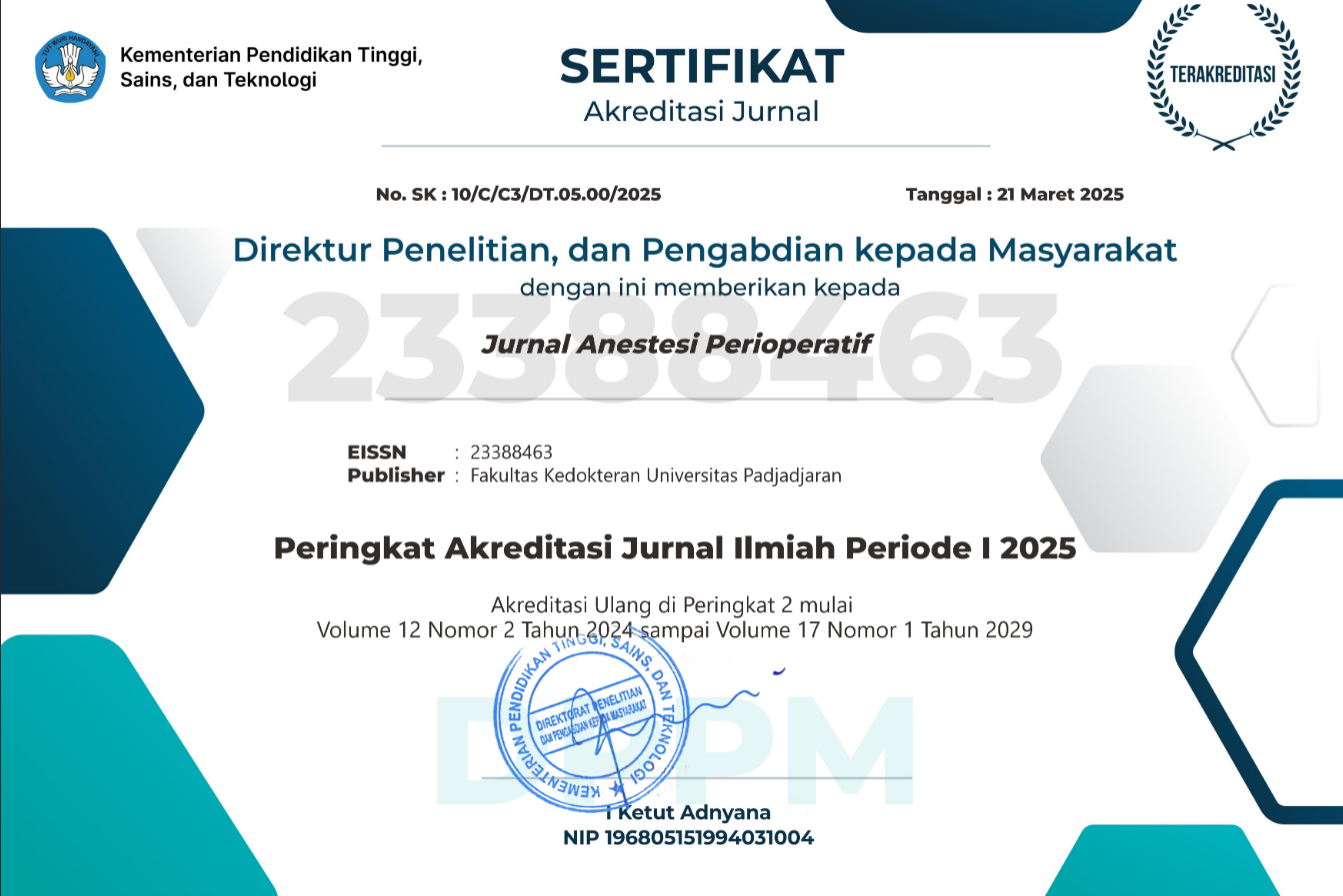Perbandingan antara Mobilisasi Cepat dan Mobilisasi Lambat terhadap Komplikasi Neurologis pada Pasien Anestesi Spinal
Abstract
Anestesi spinal merupakan metode yang ekonomis, aman, nyaman, dan efektif yang memberikan anestesi cepat dan dapat diandalkan. Pasien pascaoperasi dengan anestesi spinal yang dilakukan mobilisasi cepat memberikan keuntungan dibanding dengan mobilisasi setelah tirah baring 24 jam. Penelitian ini bertujuan menilai perbandingan antara pasien mobilisasi cepat dan mobilisasi lambat pada pasien pasca-anestesi spinal terhadap komplikasi neurologis yang terjadi. Penelitian dilakukan di Instalasi Bedah Sentral RSUD Dr. Moewardi Surakarta selama Juli–Agustus 2018. Penelitian ini menggunakan uji klinis acak tersamar ganda pada 30 pasien yang menjalani operasi dengan anestesi spinal yang memenuhi kriteria inklusi. Sampel dibagi menjadi 2 kelompok, yaitu kelompok yang mendapat perlakuan mobilisasi setelah efek anestesi spinal hilang dan kelompok yang mendapat perlakuan mobilisasi setelah tirah baring 24 jam. Hasil penelitian didapat tidak ada perbedaan yang signifikan komplikasi neurologis pada pasien pascaanestesi spinal yang dilakukan mobilisasi cepat dibanding dengan mobilisasi lambat dengan nilai p=0,456. Simpulan penelitian ini tidak ada perbedaan kejadian komplikasi neurologis antara pasien pascaanestesi spinal dengan mobilisasi cepat dan mobilisasi setelah tirah baring 24 jam.
Comparison of Neurological Complications between Rapid and Slow Mobilization in Spinal Anesthesia Patients
Spinal anesthesia is an economical, safe, convenient, and effective method that provides fast and reliable anesthesia. Postoperative patients under spinal anesthesia who underwent rapid mobilization provided an advantage over mobilization after 24 hours of bed rest. This study aimed to compare patients' fast and slow mobilization after spinal anesthesia with neurological complication incidence at the Central Surgical Installation of Dr. Moewardi Hospital Surakarta. The study was conducted in July–August 2018. This study used a double-blind, randomized clinical trial on 30 patients undergoing surgery under spinal anesthesia who met the inclusion criteria. The sample was divided into two groups: the group that received mobilization treatment after the effects of spinal anesthesia disappeared and the group that received mobilization treatment after 24 hours of bed rest. The results showed no significant difference in neurological complications in post-spinal anesthesia patients who underwent rapid mobilization compared with slow mobilization with a p-value = 0.456. This study concludes that there is no difference in the incidence of neurological complications between post-spinal anesthesia patients with rapid and slow mobilization.
Keywords
Full Text:
PDFDOI: https://doi.org/10.15851/jap.v10n1.2462
Article Metrics
Abstract view : 5568 timesPDF - 2471 times
This Journal indexed by

JAP is licensed under a Creative Commons Attribution-NonCommercial 4.0 International License
View My Stats



